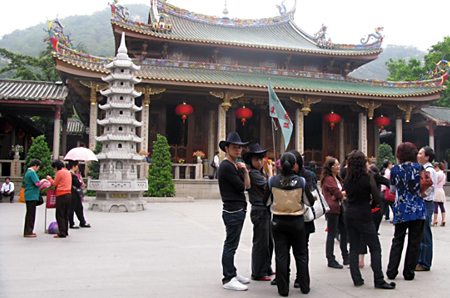
NPR’s Louisa Lim writes on the government in Beijing’s relationship with Buddhists in China. Obviously it’s a relationship with a great deal of tension. Too much is made of the Chinese government’s official atheism: In practice, Communist governments have almost always come to some sort of agreement with the religious authorities of their countries, and China has shown many signs of tolerance toward Buddhism, for example paying to rehabilitate historic shrines—to become tourist destinations, rather than places of worship, but still, progress. Tibetan Buddhism has obvious political problems, but Chinese Buddhism is a simpler matter. Lim writes:
Four years ago, eight senior monks, clad in scarlet-and-saffron-robes, filed in front of a golden Buddha and began chanting on stage in the eastern Chinese city of Hangzhou. It marked an important turning point in China’s attitude toward religion. This was the first World Buddhist Forum, attended by more than 1,000 monks, and held in China. Never before had the officially atheist country sponsored such a large religious conference. The moment signaled Beijing’s new proactive approach to religion and, in particular, its support for Buddhism, possibly as a counterweight to the explosion of Christianity in China. Tensions still remain in Beijing’s relationship to Tibetan Buddhism, particularly given believers’ loyalty to their exiled spiritual leader, the Dalai Lama. He is viewed by the Chinese government as a “splittist,” with the aim of dividing China. But Chinese Buddhism is not seen to be politically problematic in this way.
Read the whole article here.
Thank you for subscribing to Tricycle! As a nonprofit, we depend on readers like you to keep Buddhist teachings and practices widely available.